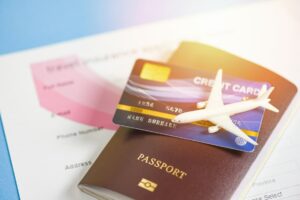How To Travel Safely
Author, playwright, and eternal free-spirit Oscar Wilde once wrote: “Live with no excuses and travel with no regrets.” We should all hope to live by such open-hearted and open-minded principles. Still, from the legal perspective at Benson & Bingham Accident Injury Lawyers, we would hasten to add a “but” at the end of Wilde’s advice. Travel with no regrets… but be smart about it.
Whether you have planned out a cross-country adventure or have decided to become a glob-trotting world explorer, making smart choices and doing some sensible planning can help ensure you have a safe, fun trip to remember.
Always Have a Plan
We appreciate the particular thrill that comes from just winging it. Many travelers enjoy meandering from destination to destination, letting coincidence and adventure take over. However, taking that spirit of unbridled adventure too far can quickly turn impractical, and even dangerous.
To be sure, traveling does not, in and of itself, pose any sort of inherent danger. Of the millions of Americans that travel overseas every year, on average, fewer than 1,000 die of unnatural causes every year, according to Time. Similar statistics exist for domestic travel.
However, poor planning can push you into bad situations. If you travel during a peak season and decide not to book a room ahead, then you could end up with questionable accommodations, or worse, no place to stay at all. The same goes for your day-to-day plans. Failing to understand the safe and less-safe areas of an unfamiliar city, or its transportation system, or the hours its businesses operate, can leave you stranded in the proverbial wrong place at the wrong time. So, even if you want to cut loose a little, have an idea where you want your day to end and how you will get there.
In addition, always have a back-up plan for what you might do in an emergency: if you were to get sick or badly injured, for example, or if someone broke into your hotel room and stole valuables. Travelers with underlying health conditions may want to investigate purchasing insurance for emergency transportation home. All travelers should consider keeping an emergency credit card and identification separate from other valuables.
Don’t Act Like a Tourist
Consider this. An Orlando, Florida, newspaper did a study about crime in that popular tourist area. The study found that crime rates rise to double the normal rate as one moves closer to the Universal Studios theme park. That seems counterintuitive. Most people would think that safety increases in public places crowded with people. However, experts suggest that, to criminals, high tourist destinations like Orlando, or Las Vegas, represent high-target environments. Tourists frequently lack familiarity with an area and carry lots of extra cash.
To minimize the risk of a wrongdoer targeting you, keep these tips in mind:
- Don’t dress like a tourist: Avoid wearing clothing that identifies you as an outsider, such as college sweatshirts from back home. Instead, observe what the locals wear and try your best to blend in.
- Carry smart: Criminals seek out easy opportunities. Don’t make yourself an easy target. Keep your wallet and valuables in your front pocket, where someone can’t take them without you noticing. If you carry a purse, wear the strap across your body, or better yet, consider investing in a theft-proof purse. If you carry a backpack, consider carrying it in front of you and using zipper locks.
- Leave the cash at home: Stick to debit or credit cards, or traveler’s checks, and only carry a minimal amount of cash. Use in-room or hotel safes to store valuables you cannot go without.
Use Common Sense
Most travel accidents and incidents happen in transit from one destination to another, such as in cars, buses, or trains. Travelers get lost or confused, and one bad decision compounds the next. Even while on vacation, you still need to make smart choices to stay safe.
Trust your gut. If you find yourself in an unfamiliar place and something feels wrong, it probably is. Basic tips to keep in mind include:
- Don’t drink and drive.
- Don’t travel alone (especially after dark or in a secluded area).
- Have backup payment methods (you may want to carry one with you and leave one at the hotel).
- Do your research. There are many resources available to tell you about how safe a destination is. If you are traveling internationally, check out travel advisories before you leave.
- Share your plans with others. Let family and friends know where you will be and when you will be back.
Allow Enough Time for Your Trip
Most people do not make good decisions when they feel rushed. They drive too fast to make up time. They fail to pay attention to people around them. They settle for less-than-ideal accommodations, food, or services. In short, feeling rushed can lead to dangerous outcomes. Do not try to squeeze too much into your travel. Be realistic, make a plan, and remain willing to pare back your expectations if you run out of time. Never risk your safety to see an attraction.
Seek Legal Help to Protect Yourself

Even with careful planning and caution, accidents happen. Vehicles crash. People fall down. Criminals take advantage of a moment of inattention to personal safety. If a preventable travel-related incident leaves you injured or ill, then you may have the right to recover substantial compensation from the parties at fault. Seeking experienced, trusted legal representation can help you protect these rights.
Do not go without an attorney just because an incident happened while traveling. Also, do not agree to take free goods or services from someone who did you harm. Accepting a comped room or tickets to a show rarely makes up for the costs of an injury, but could cause you to sacrifice your legal rights.
To learn more about your legal rights and the steps you can take moving forward, contact an experienced personal injury attorney for a free case consultation.
Benson & Bingham
626 S 10th St
Las Vegas, NV 89101
702-382-9797</a

